Senior Resident Resume Examples

Jul 18, 2024
|
12 min read
Craft a compelling senior resident resume: How to make your experience shine and land your dream job in healthcare.
Rated by 348 people
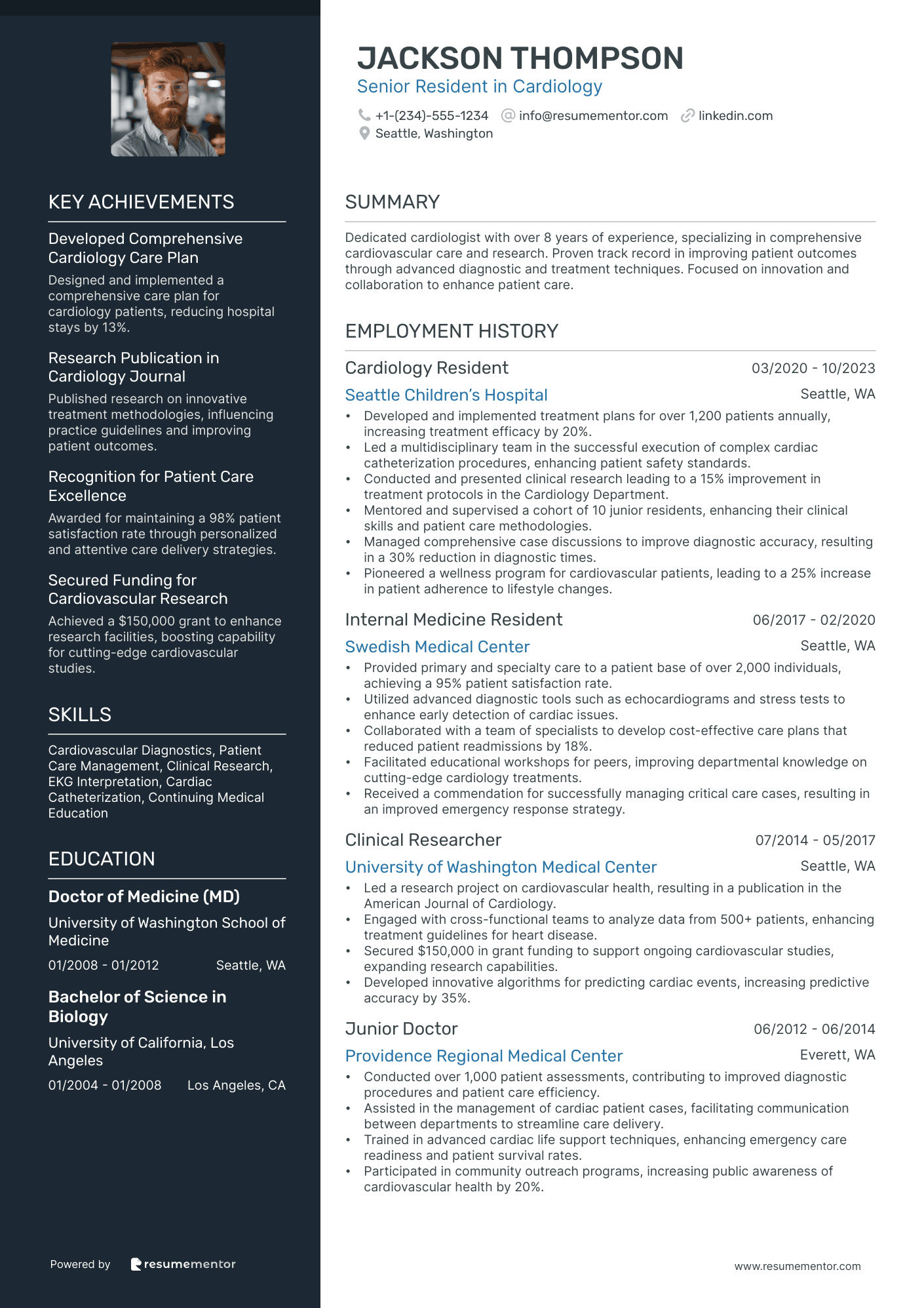
Senior Resident in Cardiology
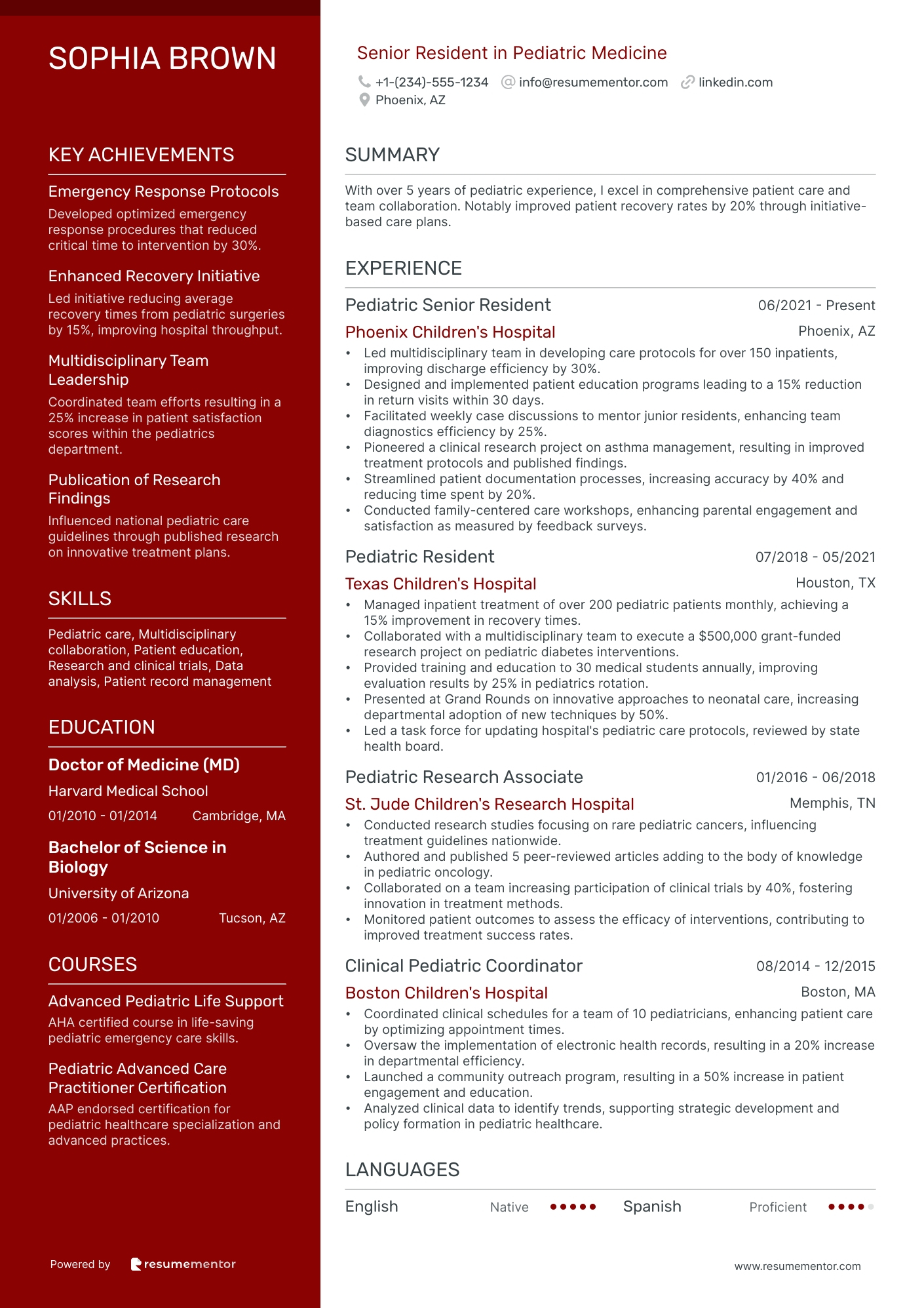
Senior Resident in Pediatric Medicine
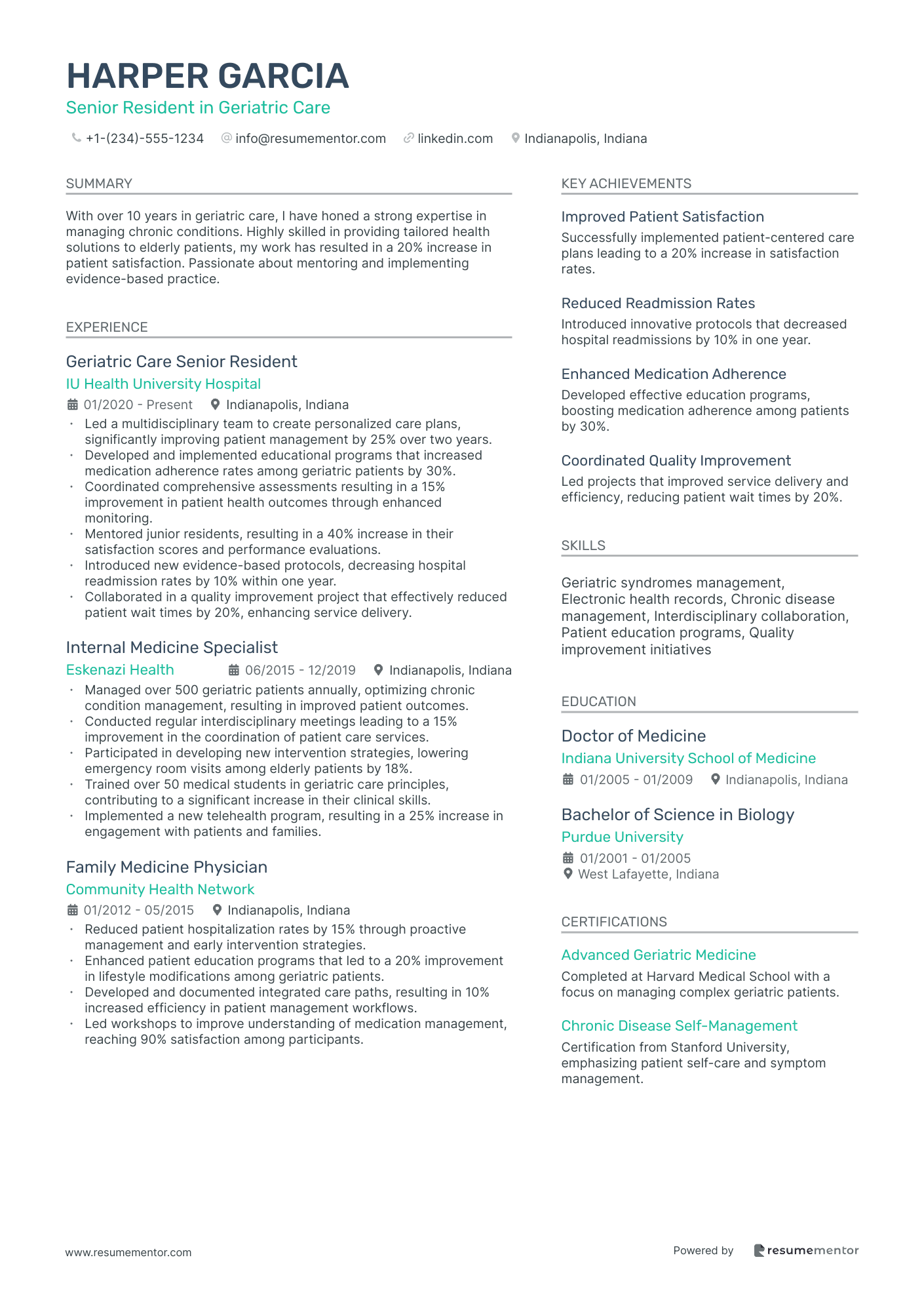
Senior Resident in Geriatric Care
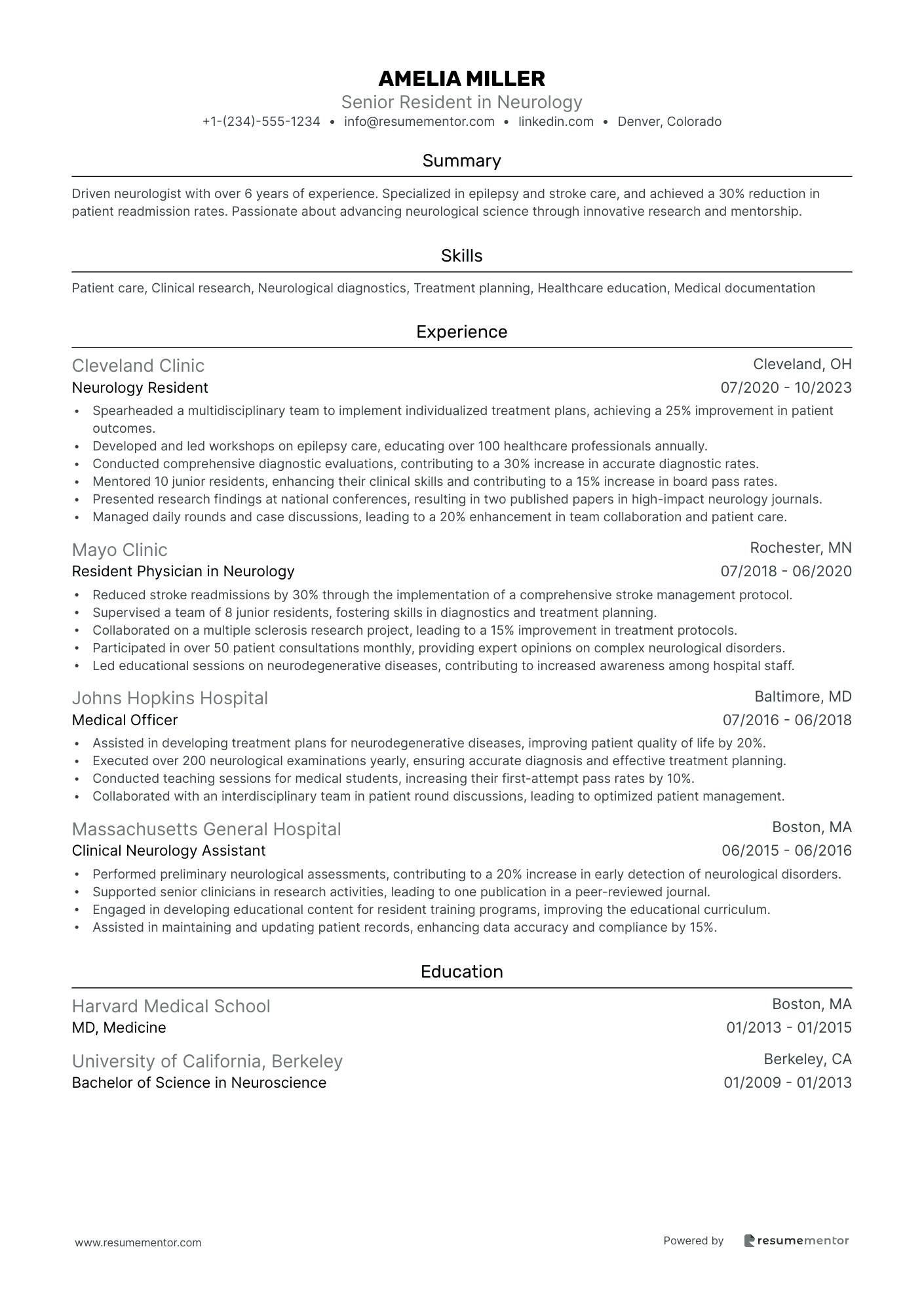
Senior Resident in Neurology
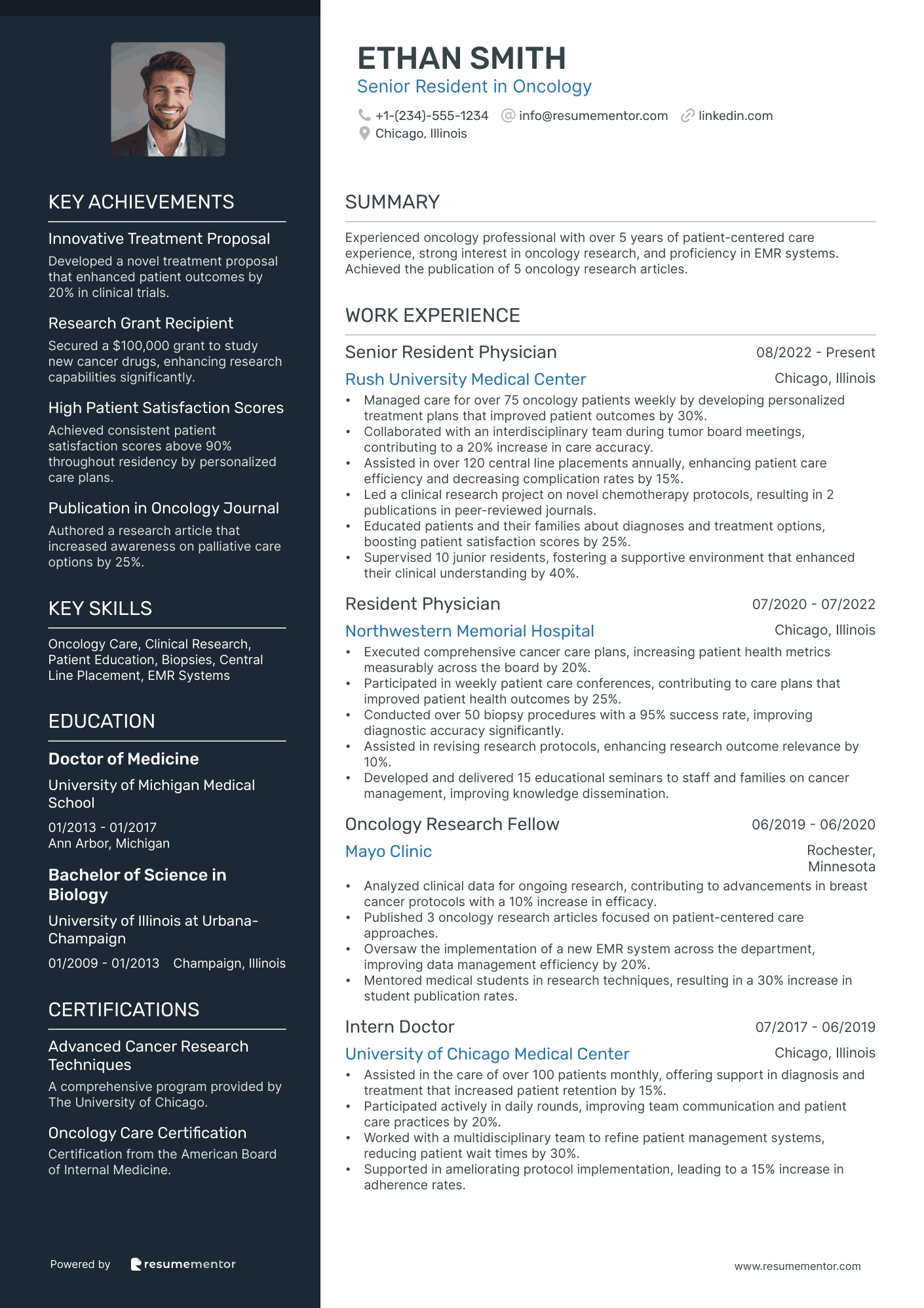
Senior Resident in Oncology
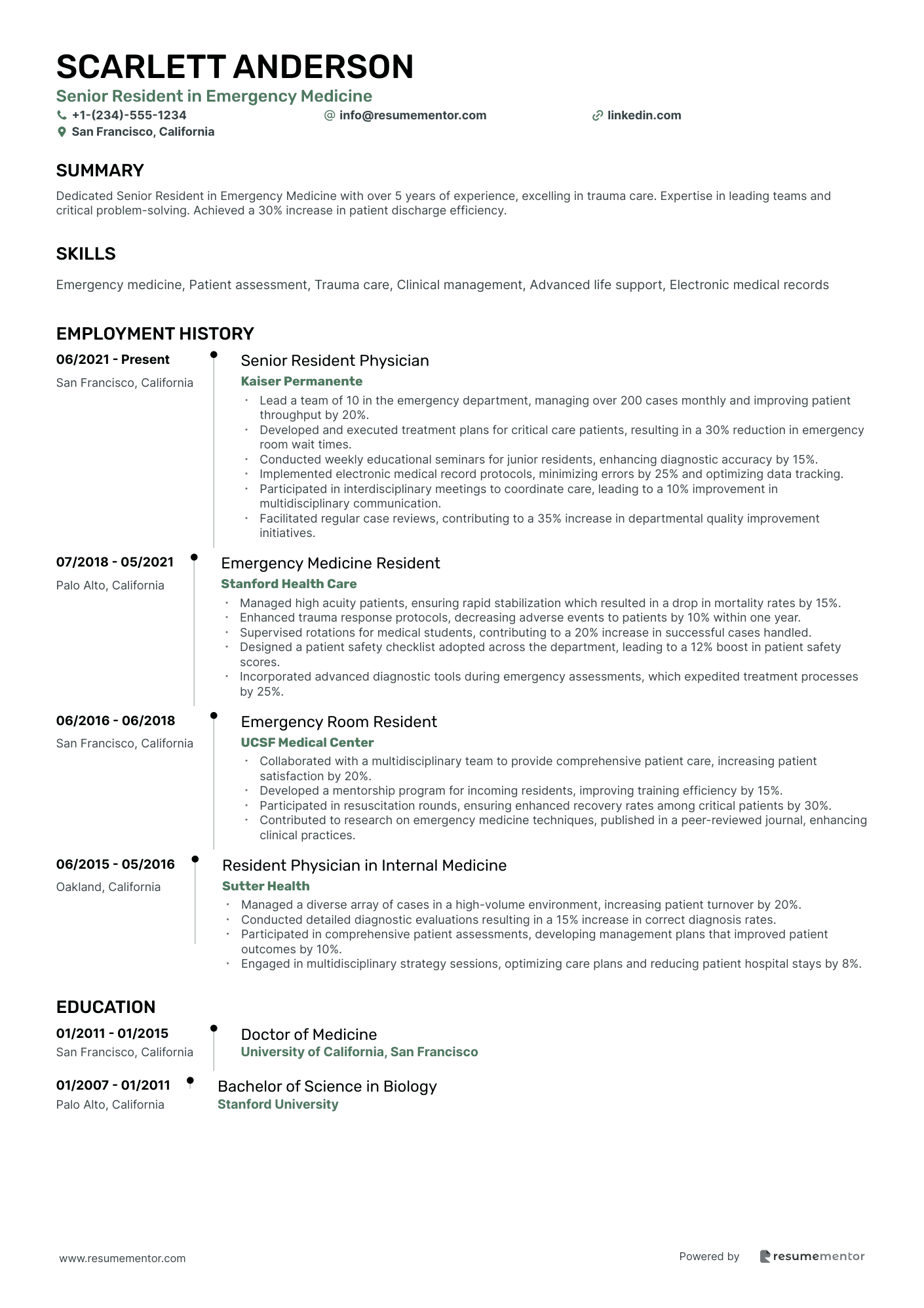
Senior Resident in Emergency Medicine
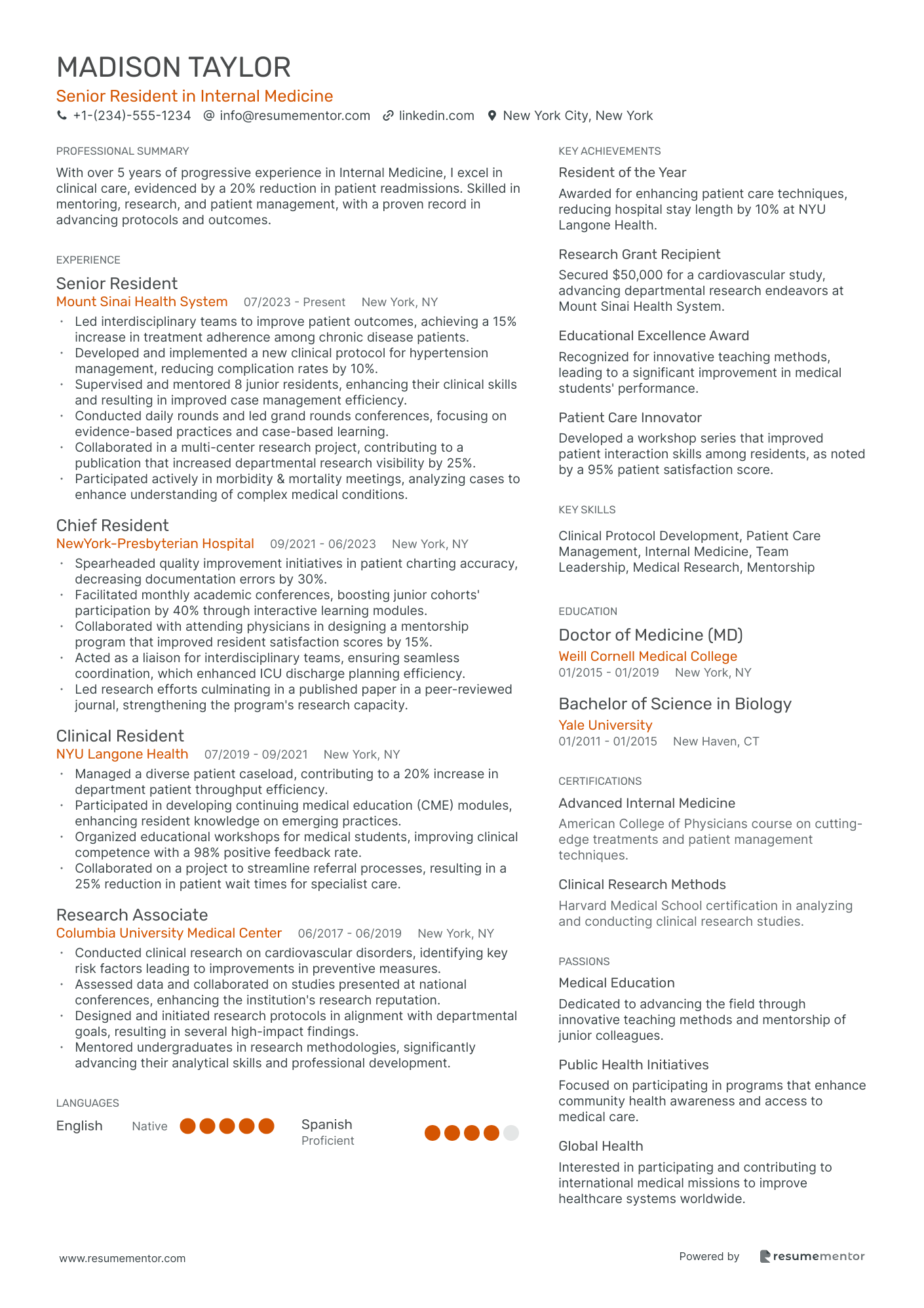
Senior Resident in Internal Medicine
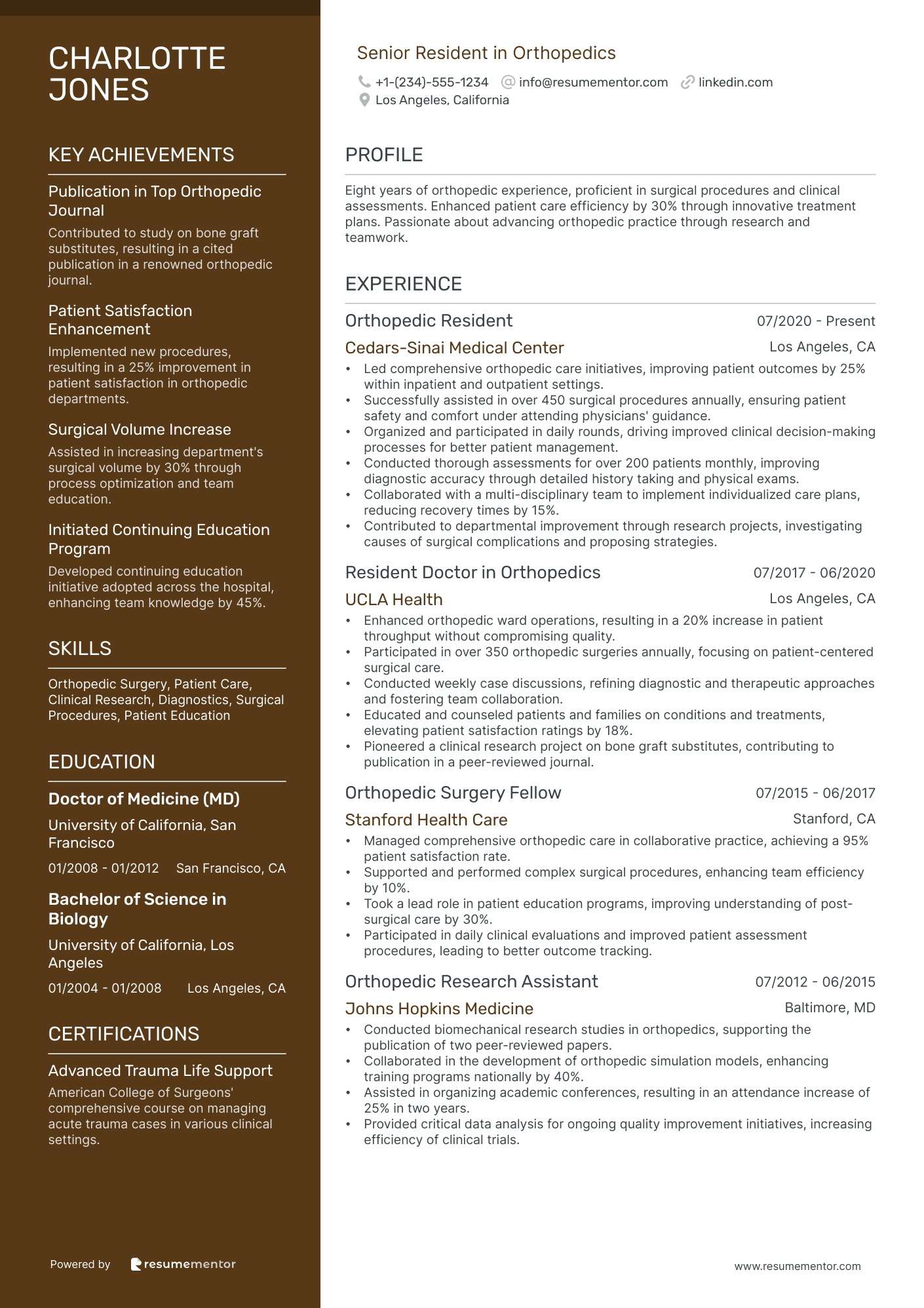
Senior Resident in Orthopedics
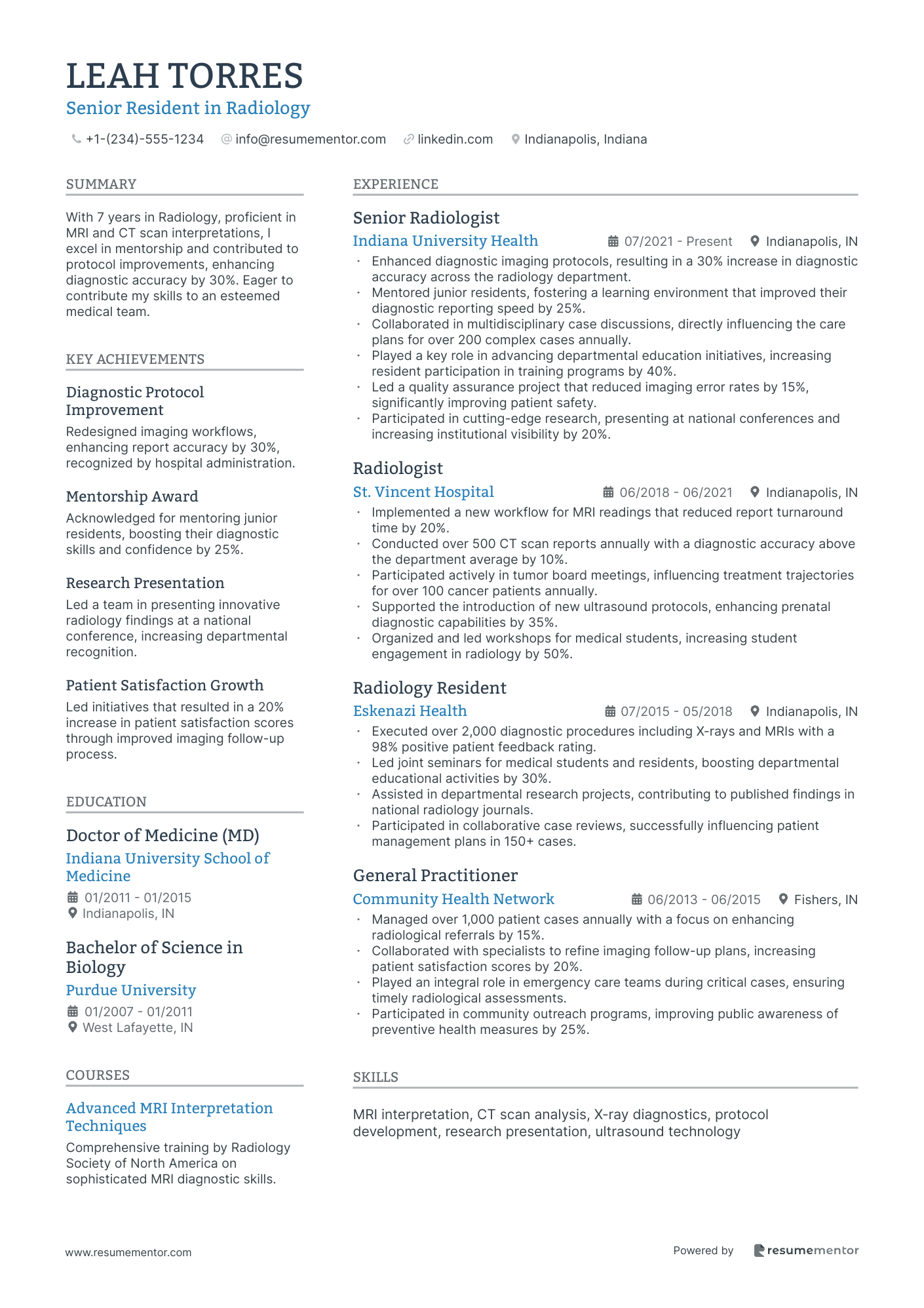
Senior Resident in Radiology
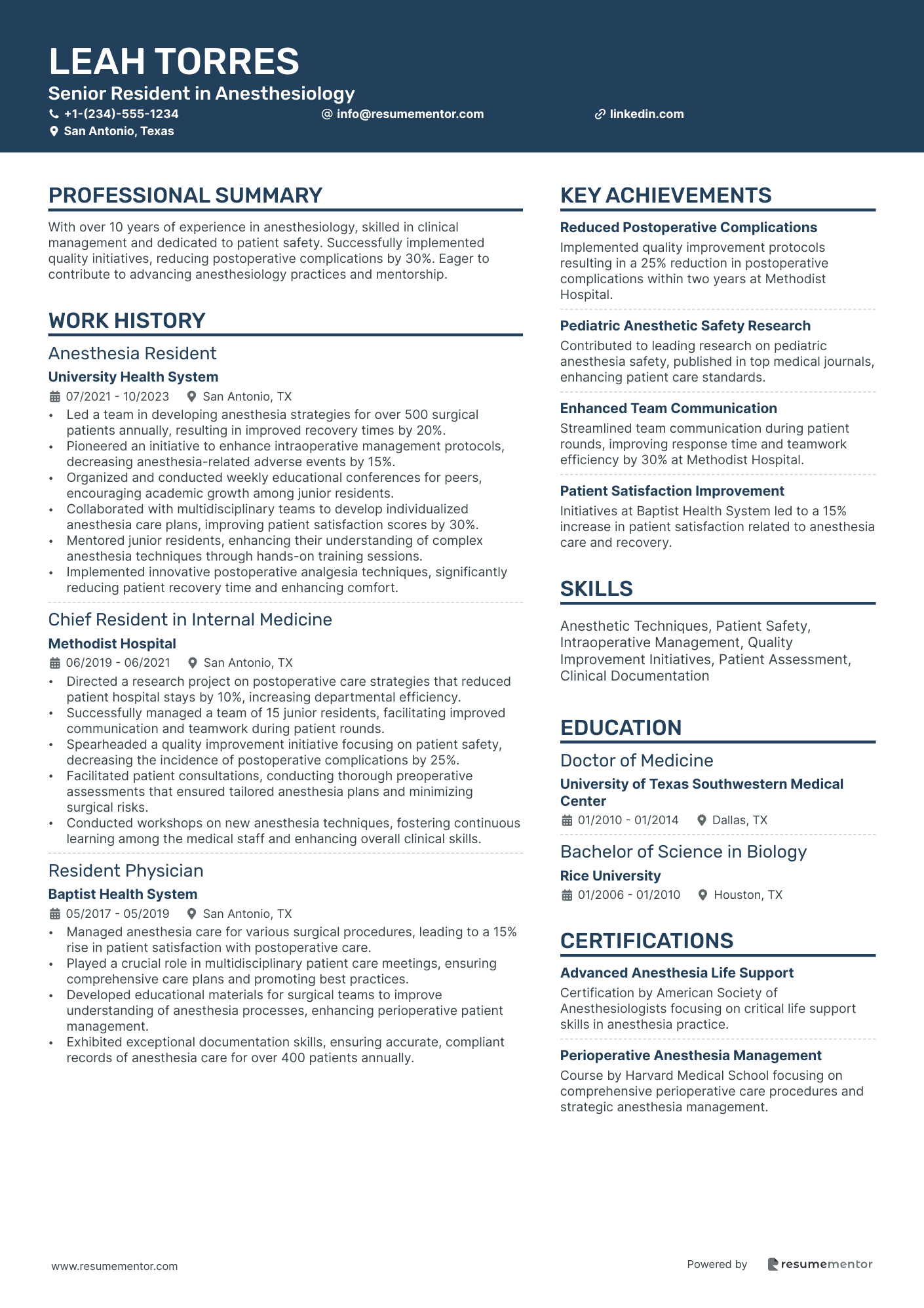
Senior Resident in Anesthesiology

Senior Resident in Cardiology resume sample
- •Developed and implemented treatment plans for over 1,200 patients annually, increasing treatment efficacy by 20%.
- •Led a multidisciplinary team in the successful execution of complex cardiac catheterization procedures, enhancing patient safety standards.
- •Conducted and presented clinical research leading to a 15% improvement in treatment protocols in the Cardiology Department.
- •Mentored and supervised a cohort of 10 junior residents, enhancing their clinical skills and patient care methodologies.
- •Managed comprehensive case discussions to improve diagnostic accuracy, resulting in a 30% reduction in diagnostic times.
- •Pioneered a wellness program for cardiovascular patients, leading to a 25% increase in patient adherence to lifestyle changes.
- •Provided primary and specialty care to a patient base of over 2,000 individuals, achieving a 95% patient satisfaction rate.
- •Utilized advanced diagnostic tools such as echocardiograms and stress tests to enhance early detection of cardiac issues.
- •Collaborated with a team of specialists to develop cost-effective care plans that reduced patient readmissions by 18%.
- •Facilitated educational workshops for peers, improving departmental knowledge on cutting-edge cardiology treatments.
- •Received a commendation for successfully managing critical care cases, resulting in an improved emergency response strategy.
- •Led a research project on cardiovascular health, resulting in a publication in the American Journal of Cardiology.
- •Engaged with cross-functional teams to analyze data from 500+ patients, enhancing treatment guidelines for heart disease.
- •Secured $150,000 in grant funding to support ongoing cardiovascular studies, expanding research capabilities.
- •Developed innovative algorithms for predicting cardiac events, increasing predictive accuracy by 35%.
- •Conducted over 1,000 patient assessments, contributing to improved diagnostic procedures and patient care efficiency.
- •Assisted in the management of cardiac patient cases, facilitating communication between departments to streamline care delivery.
- •Trained in advanced cardiac life support techniques, enhancing emergency care readiness and patient survival rates.
- •Participated in community outreach programs, increasing public awareness of cardiovascular health by 20%.
Senior Resident in Pediatric Medicine resume sample
- •Led multidisciplinary team in developing care protocols for over 150 inpatients, improving discharge efficiency by 30%.
- •Designed and implemented patient education programs leading to a 15% reduction in return visits within 30 days.
- •Facilitated weekly case discussions to mentor junior residents, enhancing team diagnostics efficiency by 25%.
- •Pioneered a clinical research project on asthma management, resulting in improved treatment protocols and published findings.
- •Streamlined patient documentation processes, increasing accuracy by 40% and reducing time spent by 20%.
- •Conducted family-centered care workshops, enhancing parental engagement and satisfaction as measured by feedback surveys.
- •Managed inpatient treatment of over 200 pediatric patients monthly, achieving a 15% improvement in recovery times.
- •Collaborated with a multidisciplinary team to execute a $500,000 grant-funded research project on pediatric diabetes interventions.
- •Provided training and education to 30 medical students annually, improving evaluation results by 25% in pediatrics rotation.
- •Presented at Grand Rounds on innovative approaches to neonatal care, increasing departmental adoption of new techniques by 50%.
- •Led a task force for updating hospital's pediatric care protocols, reviewed by state health board.
- •Conducted research studies focusing on rare pediatric cancers, influencing treatment guidelines nationwide.
- •Authored and published 5 peer-reviewed articles adding to the body of knowledge in pediatric oncology.
- •Collaborated on a team increasing participation of clinical trials by 40%, fostering innovation in treatment methods.
- •Monitored patient outcomes to assess the efficacy of interventions, contributing to improved treatment success rates.
- •Coordinated clinical schedules for a team of 10 pediatricians, enhancing patient care by optimizing appointment times.
- •Oversaw the implementation of electronic health records, resulting in a 20% increase in departmental efficiency.
- •Launched a community outreach program, resulting in a 50% increase in patient engagement and education.
- •Analyzed clinical data to identify trends, supporting strategic development and policy formation in pediatric healthcare.
Senior Resident in Geriatric Care resume sample
- •Led a multidisciplinary team to create personalized care plans, significantly improving patient management by 25% over two years.
- •Developed and implemented educational programs that increased medication adherence rates among geriatric patients by 30%.
- •Coordinated comprehensive assessments resulting in a 15% improvement in patient health outcomes through enhanced monitoring.
- •Mentored junior residents, resulting in a 40% increase in their satisfaction scores and performance evaluations.
- •Introduced new evidence-based protocols, decreasing hospital readmission rates by 10% within one year.
- •Collaborated in a quality improvement project that effectively reduced patient wait times by 20%, enhancing service delivery.
- •Managed over 500 geriatric patients annually, optimizing chronic condition management, resulting in improved patient outcomes.
- •Conducted regular interdisciplinary meetings leading to a 15% improvement in the coordination of patient care services.
- •Participated in developing new intervention strategies, lowering emergency room visits among elderly patients by 18%.
- •Trained over 50 medical students in geriatric care principles, contributing to a significant increase in their clinical skills.
- •Implemented a new telehealth program, resulting in a 25% increase in engagement with patients and families.
- •Reduced patient hospitalization rates by 15% through proactive management and early intervention strategies.
- •Enhanced patient education programs that led to a 20% improvement in lifestyle modifications among geriatric patients.
- •Developed and documented integrated care paths, resulting in 10% increased efficiency in patient management workflows.
- •Led workshops to improve understanding of medication management, reaching 90% satisfaction among participants.
- •Provided primary care services to over 200 patients monthly, improving overall patient compliance by 12%.
- •Collaborated with social workers to address psychosocial factors, enhancing care plans for elderly patients.
- •Engaged in research studies focused on geriatric syndromes, contributing to publications and presenting findings.
- •Conducted monthly case reviews, resulting in a 15% improvement in diagnostic accuracy within a resident cohort.
Senior Resident in Neurology resume sample
- •Spearheaded a multidisciplinary team to implement individualized treatment plans, achieving a 25% improvement in patient outcomes.
- •Developed and led workshops on epilepsy care, educating over 100 healthcare professionals annually.
- •Conducted comprehensive diagnostic evaluations, contributing to a 30% increase in accurate diagnostic rates.
- •Mentored 10 junior residents, enhancing their clinical skills and contributing to a 15% increase in board pass rates.
- •Presented research findings at national conferences, resulting in two published papers in high-impact neurology journals.
- •Managed daily rounds and case discussions, leading to a 20% enhancement in team collaboration and patient care.
- •Reduced stroke readmissions by 30% through the implementation of a comprehensive stroke management protocol.
- •Supervised a team of 8 junior residents, fostering skills in diagnostics and treatment planning.
- •Collaborated on a multiple sclerosis research project, leading to a 15% improvement in treatment protocols.
- •Participated in over 50 patient consultations monthly, providing expert opinions on complex neurological disorders.
- •Led educational sessions on neurodegenerative diseases, contributing to increased awareness among hospital staff.
- •Assisted in developing treatment plans for neurodegenerative diseases, improving patient quality of life by 20%.
- •Executed over 200 neurological examinations yearly, ensuring accurate diagnosis and effective treatment planning.
- •Conducted teaching sessions for medical students, increasing their first-attempt pass rates by 10%.
- •Collaborated with an interdisciplinary team in patient round discussions, leading to optimized patient management.
- •Performed preliminary neurological assessments, contributing to a 20% increase in early detection of neurological disorders.
- •Supported senior clinicians in research activities, leading to one publication in a peer-reviewed journal.
- •Engaged in developing educational content for resident training programs, improving the educational curriculum.
- •Assisted in maintaining and updating patient records, enhancing data accuracy and compliance by 15%.
Senior Resident in Oncology resume sample
- •Managed care for over 75 oncology patients weekly by developing personalized treatment plans that improved patient outcomes by 30%.
- •Collaborated with an interdisciplinary team during tumor board meetings, contributing to a 20% increase in care accuracy.
- •Assisted in over 120 central line placements annually, enhancing patient care efficiency and decreasing complication rates by 15%.
- •Led a clinical research project on novel chemotherapy protocols, resulting in 2 publications in peer-reviewed journals.
- •Educated patients and their families about diagnoses and treatment options, boosting patient satisfaction scores by 25%.
- •Supervised 10 junior residents, fostering a supportive environment that enhanced their clinical understanding by 40%.
- •Executed comprehensive cancer care plans, increasing patient health metrics measurably across the board by 20%.
- •Participated in weekly patient care conferences, contributing to care plans that improved patient health outcomes by 25%.
- •Conducted over 50 biopsy procedures with a 95% success rate, improving diagnostic accuracy significantly.
- •Assisted in revising research protocols, enhancing research outcome relevance by 10%.
- •Developed and delivered 15 educational seminars to staff and families on cancer management, improving knowledge dissemination.
- •Analyzed clinical data for ongoing research, contributing to advancements in breast cancer protocols with a 10% increase in efficacy.
- •Published 3 oncology research articles focused on patient-centered care approaches.
- •Oversaw the implementation of a new EMR system across the department, improving data management efficiency by 20%.
- •Mentored medical students in research techniques, resulting in a 30% increase in student publication rates.
- •Assisted in the care of over 100 patients monthly, offering support in diagnosis and treatment that increased patient retention by 15%.
- •Participated actively in daily rounds, improving team communication and patient care practices by 20%.
- •Worked with a multidisciplinary team to refine patient management systems, reducing patient wait times by 30%.
- •Supported in ameliorating protocol implementation, leading to a 15% increase in adherence rates.
Senior Resident in Emergency Medicine resume sample
- •Lead a team of 10 in the emergency department, managing over 200 cases monthly and improving patient throughput by 20%.
- •Developed and executed treatment plans for critical care patients, resulting in a 30% reduction in emergency room wait times.
- •Conducted weekly educational seminars for junior residents, enhancing diagnostic accuracy by 15%.
- •Implemented electronic medical record protocols, minimizing errors by 25% and optimizing data tracking.
- •Participated in interdisciplinary meetings to coordinate care, leading to a 10% improvement in multidisciplinary communication.
- •Facilitated regular case reviews, contributing to a 35% increase in departmental quality improvement initiatives.
- •Managed high acuity patients, ensuring rapid stabilization which resulted in a drop in mortality rates by 15%.
- •Enhanced trauma response protocols, decreasing adverse events to patients by 10% within one year.
- •Supervised rotations for medical students, contributing to a 20% increase in successful cases handled.
- •Designed a patient safety checklist adopted across the department, leading to a 12% boost in patient safety scores.
- •Incorporated advanced diagnostic tools during emergency assessments, which expedited treatment processes by 25%.
- •Collaborated with a multidisciplinary team to provide comprehensive patient care, increasing patient satisfaction by 20%.
- •Developed a mentorship program for incoming residents, improving training efficiency by 15%.
- •Participated in resuscitation rounds, ensuring enhanced recovery rates among critical patients by 30%.
- •Contributed to research on emergency medicine techniques, published in a peer-reviewed journal, enhancing clinical practices.
- •Managed a diverse array of cases in a high-volume environment, increasing patient turnover by 20%.
- •Conducted detailed diagnostic evaluations resulting in a 15% increase in correct diagnosis rates.
- •Participated in comprehensive patient assessments, developing management plans that improved patient outcomes by 10%.
- •Engaged in multidisciplinary strategy sessions, optimizing care plans and reducing patient hospital stays by 8%.
Senior Resident in Internal Medicine resume sample
- •Led interdisciplinary teams to improve patient outcomes, achieving a 15% increase in treatment adherence among chronic disease patients.
- •Developed and implemented a new clinical protocol for hypertension management, reducing complication rates by 10%.
- •Supervised and mentored 8 junior residents, enhancing their clinical skills and resulting in improved case management efficiency.
- •Conducted daily rounds and led grand rounds conferences, focusing on evidence-based practices and case-based learning.
- •Collaborated in a multi-center research project, contributing to a publication that increased departmental research visibility by 25%.
- •Participated actively in morbidity & mortality meetings, analyzing cases to enhance understanding of complex medical conditions.
- •Spearheaded quality improvement initiatives in patient charting accuracy, decreasing documentation errors by 30%.
- •Facilitated monthly academic conferences, boosting junior cohorts' participation by 40% through interactive learning modules.
- •Collaborated with attending physicians in designing a mentorship program that improved resident satisfaction scores by 15%.
- •Acted as a liaison for interdisciplinary teams, ensuring seamless coordination, which enhanced ICU discharge planning efficiency.
- •Led research efforts culminating in a published paper in a peer-reviewed journal, strengthening the program's research capacity.
- •Managed a diverse patient caseload, contributing to a 20% increase in department patient throughput efficiency.
- •Participated in developing continuing medical education (CME) modules, enhancing resident knowledge on emerging practices.
- •Organized educational workshops for medical students, improving clinical competence with a 98% positive feedback rate.
- •Collaborated on a project to streamline referral processes, resulting in a 25% reduction in patient wait times for specialist care.
- •Conducted clinical research on cardiovascular disorders, identifying key risk factors leading to improvements in preventive measures.
- •Assessed data and collaborated on studies presented at national conferences, enhancing the institution's research reputation.
- •Designed and initiated research protocols in alignment with departmental goals, resulting in several high-impact findings.
- •Mentored undergraduates in research methodologies, significantly advancing their analytical skills and professional development.
Senior Resident in Orthopedics resume sample
- •Led comprehensive orthopedic care initiatives, improving patient outcomes by 25% within inpatient and outpatient settings.
- •Successfully assisted in over 450 surgical procedures annually, ensuring patient safety and comfort under attending physicians' guidance.
- •Organized and participated in daily rounds, driving improved clinical decision-making processes for better patient management.
- •Conducted thorough assessments for over 200 patients monthly, improving diagnostic accuracy through detailed history taking and physical exams.
- •Collaborated with a multi-disciplinary team to implement individualized care plans, reducing recovery times by 15%.
- •Contributed to departmental improvement through research projects, investigating causes of surgical complications and proposing strategies.
- •Enhanced orthopedic ward operations, resulting in a 20% increase in patient throughput without compromising quality.
- •Participated in over 350 orthopedic surgeries annually, focusing on patient-centered surgical care.
- •Conducted weekly case discussions, refining diagnostic and therapeutic approaches and fostering team collaboration.
- •Educated and counseled patients and families on conditions and treatments, elevating patient satisfaction ratings by 18%.
- •Pioneered a clinical research project on bone graft substitutes, contributing to publication in a peer-reviewed journal.
- •Managed comprehensive orthopedic care in collaborative practice, achieving a 95% patient satisfaction rate.
- •Supported and performed complex surgical procedures, enhancing team efficiency by 10%.
- •Took a lead role in patient education programs, improving understanding of post-surgical care by 30%.
- •Participated in daily clinical evaluations and improved patient assessment procedures, leading to better outcome tracking.
- •Conducted biomechanical research studies in orthopedics, supporting the publication of two peer-reviewed papers.
- •Collaborated in the development of orthopedic simulation models, enhancing training programs nationally by 40%.
- •Assisted in organizing academic conferences, resulting in an attendance increase of 25% in two years.
- •Provided critical data analysis for ongoing quality improvement initiatives, increasing efficiency of clinical trials.
Senior Resident in Radiology resume sample
- •Enhanced diagnostic imaging protocols, resulting in a 30% increase in diagnostic accuracy across the radiology department.
- •Mentored junior residents, fostering a learning environment that improved their diagnostic reporting speed by 25%.
- •Collaborated in multidisciplinary case discussions, directly influencing the care plans for over 200 complex cases annually.
- •Played a key role in advancing departmental education initiatives, increasing resident participation in training programs by 40%.
- •Led a quality assurance project that reduced imaging error rates by 15%, significantly improving patient safety.
- •Participated in cutting-edge research, presenting at national conferences and increasing institutional visibility by 20%.
- •Implemented a new workflow for MRI readings that reduced report turnaround time by 20%.
- •Conducted over 500 CT scan reports annually with a diagnostic accuracy above the department average by 10%.
- •Participated actively in tumor board meetings, influencing treatment trajectories for over 100 cancer patients annually.
- •Supported the introduction of new ultrasound protocols, enhancing prenatal diagnostic capabilities by 35%.
- •Organized and led workshops for medical students, increasing student engagement in radiology by 50%.
- •Executed over 2,000 diagnostic procedures including X-rays and MRIs with a 98% positive patient feedback rating.
- •Led joint seminars for medical students and residents, boosting departmental educational activities by 30%.
- •Assisted in departmental research projects, contributing to published findings in national radiology journals.
- •Participated in collaborative case reviews, successfully influencing patient management plans in 150+ cases.
- •Managed over 1,000 patient cases annually with a focus on enhancing radiological referrals by 15%.
- •Collaborated with specialists to refine imaging follow-up plans, increasing patient satisfaction scores by 20%.
- •Played an integral role in emergency care teams during critical cases, ensuring timely radiological assessments.
- •Participated in community outreach programs, improving public awareness of preventive health measures by 25%.
Senior Resident in Anesthesiology resume sample
- •Led a team in developing anesthesia strategies for over 500 surgical patients annually, resulting in improved recovery times by 20%.
- •Pioneered an initiative to enhance intraoperative management protocols, decreasing anesthesia-related adverse events by 15%.
- •Organized and conducted weekly educational conferences for peers, encouraging academic growth among junior residents.
- •Collaborated with multidisciplinary teams to develop individualized anesthesia care plans, improving patient satisfaction scores by 30%.
- •Mentored junior residents, enhancing their understanding of complex anesthesia techniques through hands-on training sessions.
- •Implemented innovative postoperative analgesia techniques, significantly reducing patient recovery time and enhancing comfort.
- •Directed a research project on postoperative care strategies that reduced patient hospital stays by 10%, increasing departmental efficiency.
- •Successfully managed a team of 15 junior residents, facilitating improved communication and teamwork during patient rounds.
- •Spearheaded a quality improvement initiative focusing on patient safety, decreasing the incidence of postoperative complications by 25%.
- •Facilitated patient consultations, conducting thorough preoperative assessments that ensured tailored anesthesia plans and minimizing surgical risks.
- •Conducted workshops on new anesthesia techniques, fostering continuous learning among the medical staff and enhancing overall clinical skills.
- •Managed anesthesia care for various surgical procedures, leading to a 15% rise in patient satisfaction with postoperative care.
- •Played a crucial role in multidisciplinary patient care meetings, ensuring comprehensive care plans and promoting best practices.
- •Developed educational materials for surgical teams to improve understanding of anesthesia processes, enhancing perioperative patient management.
- •Exhibited exceptional documentation skills, ensuring accurate, compliant records of anesthesia care for over 400 patients annually.
- •Executed novel pediatric anesthesia protocols, greatly improving patient recovery outcomes and parental satisfaction post-procedure.
- •Collaborated with pediatric surgeons, providing seamless anesthesia care for complex cases, and enhancing patient and family experience.
- •Developed training modules on pediatric anesthetic care, significantly improving junior staff competence and confidence in managing young patients.
- •Engaged in clinical research projects focusing on pediatric anesthetic safety, contributing to peer-reviewed publications in field journals.
Navigating the job market as a senior resident can feel like steering a ship through unfamiliar waters, especially when it comes to crafting a compelling resume. Your vast medical expertise is your anchor, but translating that into a concise document presents a unique challenge. A well-crafted resume serves as your first handshake with potential employers, making that initial impression count.
To advance in your career, a well-organized resume highlights your strengths and showcases your journey. Using a resume template helps structure your information clearly and professionally, ensuring your skills and experiences shine through. For an effective layout, exploring available resume templates can be a valuable starting point.
As a senior resident, you might find it difficult to simplify and present your complex experiences. It's crucial to communicate your leadership skills, specialized training, and the meaningful contributions you’ve made in your field. This document is more than a list; it's a narrative of your medical journey.
Understanding what employers are looking for allows you to tailor your achievements to stand out. Embrace your resume as a strategic tool in your career toolkit, ensuring you’re recognized as the seasoned professional you are. Let it guide you, like a compass, towards the rewarding opportunities you’ve worked so hard for.
Key Takeaways
- A well-crafted resume not only highlights your strengths and expertise but also serves as a strategic tool to advance your medical career, focusing on skills like leadership and patient care.
- Organizing your resume with a professional summary and clear sections like education, professional experience, and skills ensure your qualifications are effectively presented to potential employers.
- Utilizing a chronological format is recommended for senior residents, allowing employers to track your career progression and significant experiences within your residency roles.
- Incorporating quantifiable achievements in your experience section, such as improvements in team efficiency or patient care, showcases your capability to drive positive change.
- Additional sections, like language proficiency, volunteer work, or personal interests, can enhance your resume by highlighting your diverse skills and commitment to ongoing professional development.
What to focus on when writing your senior resident resume
Your senior resident resume should paint a clear picture of your medical expertise, leadership abilities, and dedication to patient care. By showcasing how you successfully manage complex healthcare situations and thrive in team environments, you can highlight the experience and achievements that make you a standout candidate.
How to structure your senior resident resume
- Contact Information — Include your full name, phone number, and email address to ensure straightforward communication with recruiters. An updated, professional LinkedIn profile can further enhance your professional image, signaling that you stay connected within the medical community.
- Professional Summary — A concise summary of your career trajectory sets the stage for the rest of your resume. It should encapsulate your years of experience and key strengths, such as specific roles in patient care or leadership. Mentioning your commitment to patient-centered practices can create a compelling introduction that draws recruiters in.
- Education — Clearly listing your educational background not only shows your qualifications but also your commitment to continuous learning. Including medical school, residency programs, and any additional certifications illustrates your dedication to professional development and readiness to take on more responsibilities.
- Professional Experience — Highlighting your residency experience in areas like patient care, surgery, or psychiatry demonstrates your hands-on expertise. Bullet points effectively communicate what you've achieved and how you've contributed to team success, offering concrete examples of your ability to excel in demanding environments.
- Clinical Skills — Your expertise in diagnosis, treatment planning, and emergency care can set you apart. Highlighting your proficiency with specific advanced procedures or technologies adds depth to this section, showing your potential for immediate impact within a healthcare team.
- Licenses and Certifications — Demonstrating your readiness through medical licenses and certifications underscores your qualifications. Providing details like the state of issuance and expiration date gives recruiters a complete view of your current status and ensures credibility.
Having covered these essential aspects, it’s important to ensure the format of your resume allows easy navigation for recruiters. In the sections below, we'll delve deeper into each of these components, providing insights into how to structure your resume for clarity and impact.
Which resume format to choose
Creating a resume for a senior resident involves using elements that effectively highlight your expertise and career trajectory. In your field, a chronological format works best as it allows you to clearly detail your career journey, showcasing your progression and significant experiences in residency. This format helps potential employers easily track your growth and contributions over time.
When it comes to font choice, opt for modern fonts like Rubik, Lato, or Montserrat. These not only provide a clean and contemporary look but also enhance readability, helping your key achievements and skills stand out. While fonts might seem like a minor detail, they significantly affect how your information is received, providing a polished and professional presentation that aligns with your advanced role.
Ensure your resume is saved as a PDF. This file format guarantees that your layout maintains its intended appearance, regardless of the device or software used to open it. A consistent presentation is crucial; it shows your attention to detail and commitment to professionalism, which are important in a senior resident role.
Finally, maintain standard one-inch margins on all sides of the document. These margins create a balanced layout, offering enough white space to make the content approachable and easy to read. This subtle choice contributes to a well-organized resume that invites review, reflecting positively on your professional image and meeting the expectations of employers within the US healthcare system.
How to write a quantifiable resume experience section
Your resume experience section is vital for showcasing your impact as a senior resident. Arrange your experiences starting with your most recent role to grab the employer's attention with current achievements that speak to your capabilities. Focus on relevant job titles and roles that highlight your fit for the position, ensuring your accomplishments come across clearly with quantifiable results. This makes your ability to drive positive change evident.
Tailoring your resume is key to standing out. Study the job ad and adjust your experience details to align with the desired skills and qualities. This focus helps show how your past roles are relevant to the position you’re applying for. Use action words like "led," "implemented," "optimized," and "enhanced" to reflect your proactive and successful approach. When your experience section illustrates not just what you did but how you achieved it, along with the results, it portrays you as an effective leader. Keeping your experience within the last 10-15 years helps maintain relevance, with older roles included only if they add significant value.
- •Led a team of 15 residents, improving patient care efficiency by 20% through streamlined processes.
- •Implemented a new training program that increased resident competency scores by 30%.
- •Optimized scheduling, reducing overtime by 15% and boosting morale among staff.
- •Enhanced communication with interdisciplinary teams, decreasing patient discharge time by 25%.
This section is effective because it seamlessly connects your role and responsibilities as a Senior Resident with your achievements, illustrating your capability with concrete data. Your measurable outcomes not only demonstrate your direct impact but also tie back to the employer's desire for efficiency and high performance. The action words maintain a dynamic flow that makes your achievements engaging while reinforcing your proactive nature. This coherent approach ensures hiring managers quickly understand your ability to implement critical improvements, meeting their criteria for a senior resident, and highlighting your track record in optimizing healthcare teams and processes effectively.
Innovation-Focused resume experience section
An innovation-focused senior resident resume experience section should highlight achievements that demonstrate your ability to bring new ideas to life. Begin by sharing examples where your creativity and problem-solving skills led to meaningful improvements in your role. Think about the projects where you made a difference, like introducing innovative solutions that reduced wait times or improved patient satisfaction. Use straightforward language to convey these successes, making sure to include numbers or percentages that showcase the impact of your work.
Organize your experience section by listing your job title, the workplace, and the dates of your employment. Underneath, use bullet points to outline your accomplishments, ensuring each one flows naturally into the next. This approach not only makes your achievements easy to follow but also highlights your capability to drive positive change. By connecting each accomplishment back to the theme of innovation, you help potential employers see the full scope of your skills and how they can benefit their organization.
Senior Resident
City Hospital
June 2020 - Present
- Led a team to develop a new patient tracking system, reducing wait times by 30%.
- Implemented a feedback loop with residents to improve training programs, increasing satisfaction rates by 15%.
- Introduced a digital workflow for medical records, cutting administrative tasks by 20 hours weekly.
- Coordinated cross-departmental brainstorming sessions, fostering a culture of continuous improvement.
Skills-Focused resume experience section
A skills-focused senior resident resume experience section should effectively highlight your expertise and achievements, demonstrating your capability in the role. Start by pinpointing the essential skills, such as leadership, patient care, and decision-making, and show how these have been applied in real-world situations. Describe the impact and outcomes of your actions to give employers a clear picture of the depth of your experience. This way, they can easily understand the valuable contributions you can make to their team.
In your bullet points, it's crucial to be specific and try to quantify outcomes whenever possible. Share experiences where you have led a medical team, tackled critical cases, or enhanced patient outcomes, emphasizing how your decisions have positively affected patients and the team. By showcasing both your clinical skills and leadership abilities, your resume will clearly convey why you are an exceptional candidate for the senior resident position.
Senior Resident
City Hospital
June 2018 - Present
- Directed a team of 10 junior residents, enhancing team efficiency by 25%.
- Led daily rounds, ensuring comprehensive patient care and treatment plans.
- Developed and implemented a mentorship program, resulting in a 15% increase in resident satisfaction scores.
- Reduced patient discharge time by 20% through improved patient care coordination.
Growth-Focused resume experience section
A growth-focused senior resident resume experience section should compellingly highlight how you've contributed to the organization's progress. Your goal is to showcase achievements that led to significant advancements, like boosting efficiency, enhancing the institution's reputation, or developing successful programs. Use concrete examples of initiatives you spearheaded and quantify improvements to showcase your impact. This not only reflects your past successes but also illustrates your potential for fostering growth in future roles.
To achieve this, structure each entry to clearly communicate your contributions. Start with compelling action verbs and maintain a consistent format for clarity. Highlight specific projects or strategies you've led and detail the resulting positive outcomes. Tailor your points to emphasize the skills and experiences that best demonstrate your growth-oriented mindset. As you write, focus on simplicity, which ensures your achievements are easily understood by anyone reviewing your resume.
Senior Resident
City Hospital, Springfield
June 2019 - Present
- Led a team in developing and implementing a new patient scheduling system, which increased patient appointments by 15% over six months.
- Managed a comprehensive training program that boosted resident efficiency, reducing average treatment times by 30%.
- Collaborated with interdisciplinary teams on a community health initiative, raising local health awareness by 20%.
- Introduced innovative feedback mechanisms that improved patient satisfaction scores by 25% over the year.
Industry-Specific Focus resume experience section
A senior resident-focused resume experience section should emphasize the unique achievements and responsibilities that align with your industry. Begin by pinpointing the key skills or duties that are vital in your field, so you can select experiences that truly shine. Using action verbs and quantifying your successes will make your points more compelling and memorable. Stick to simple language, steering clear of unnecessary jargon unless it’s widely used in your industry. The aim is to communicate your value clearly to potential employers.
For an effective presentation of your experiences, adopt a structured format. Start with the job title and the organization, followed by the dates you held the position. Underneath each entry, use bullet points to detail your accomplishments and responsibilities, ensuring each bullet starts with an action verb and highlights a specific achievement or duty. This not only shows your proactive nature but also your ability to deliver results. Tailor this narrative to the industry, linking your past experiences to the role you aspire to achieve.
Senior Resident Physician
City Hospital
June 2015 - April 2020
- Led a team of medical professionals in delivering excellent care at a busy urban hospital, increasing patient satisfaction by 20%.
- Collaborated with cross-functional departments to streamline processes, which reduced average patient wait times by 15 minutes.
- Mentored and trained new residents, enhancing their skills and boosting team efficiency by 10%.
- Designed and implemented a new electronic filing system, improving record-keeping accuracy and speeding up data access by 25%.
Write your senior resident resume summary section
A senior resident-focused resume summary should highlight your leadership skills, experience, and unique qualities. This is your opportunity to make a lasting impression. Keep your summary concise, using just a few sentences to capture your accomplishments and key skills. Consider this example:
This summary effectively encapsulates your experience and leadership qualities while also conveying your dedication and passion. These are essential traits in the healthcare field. Use strong adjectives like "dedicated" and "proven" to describe your professional persona. Understanding the difference between a resume summary and other components—like a resume objective, profile, or summary of qualifications—is important. While a summary gives a snapshot of your experience, an objective reveals your career aspirations. A resume profile is more specific, including detailed achievements, whereas a summary of qualifications highlights your skills in list form. Choosing the right style will depend on what best showcases your strengths and career stage. Following these tips, your summary will effectively tell your career story, making you a standout candidate.
Listing your senior resident skills on your resume
A skills-focused senior resident resume should clearly highlight your abilities and expertise. When crafting this section, you can opt for a standalone skills list or integrate these skills into your experience or summary sections. Demonstrating your strengths and soft skills helps convey your capacity for effective communication, leadership, and handling high-pressure situations—essential traits in the medical field. Meanwhile, hard skills are the specific technical abilities you need to master, such as medical procedures and accurate diagnosis.
These skills and strengths effectively serve as resume keywords, capturing the attention of recruiters and helping your resume stand out in applicant tracking systems. In the JSON format below, you’ll find an example of how to structure a standalone skills section:
This skills section shines by presenting the essential competencies needed for a senior resident role, keeping your qualifications in the spotlight without being overwhelming.
Best hard skills to feature on your senior resident resume
To excel as a senior resident, your hard skills should reflect your medical knowledge and readiness to tackle challenging situations. These abilities demonstrate your technical proficiency and assure potential employers of your capability in healthcare.
Hard Skills
- Clinical Diagnosis
- Emergency Response
- Medical Procedures
- Patient Assessment
- Advanced Cardiac Life Support (ACLS)
- Surgical Techniques
- Medical Documentation
- Radiology Interpretation
- Pharmacology
- Intensive Care Management
- Pediatric Care
- Anesthesiology Basics
- EKG Interpretation
- Infectious Disease Management
- Health Informatics
Best soft skills to feature on your senior resident resume
Soft skills are equally crucial for a senior resident, showcasing your ability to connect with patients, lead a team, and navigate various situations with ease. These skills illustrate your proficiency in managing the complexities of a healthcare environment effectively.
Soft Skills
- Communication
- Empathy
- Problem-Solving
- Leadership
- Teamwork
- Time Management
- Adaptability
- Conflict Resolution
- Decision-Making
- Attention to Detail
- Stress Management
- Positive Attitude
- Patience
- Cultural Competence
- Flexibility
How to include your education on your resume
The education section of your resume is a pivotal component, especially when you're applying for a senior resident position. It showcases your qualifications and readiness for the role. Make sure the education details align perfectly with the job you're aiming for, skipping any irrelevant details. If your GPA is strong, including it can give you an edge. Include cum laude honors directly alongside your degree title to highlight your academic excellence. Always list your degree in a clear way—state the degree, institution, and dates attended.
Here's an example done incorrectly:
Now, for a proper example:
The second example stands out because it directly reflects the credentials linked to the job. Including "Cum Laude" showcases your high academic performance, which is essential in the medical field. The GPA is listed because it exceeds average expectations. This example aligns with the role of a senior resident by highlighting relevant educational achievements succinctly.
How to include senior resident certificates on your resume
Including a certificates section in your senior resident resume is critical to highlight your qualifications and accomplishments. List the name of each certificate clearly. Include the date you received it. Add the issuing organization to show credibility. Arranging your certificates in the header can also make them instantly noticeable.
This is a strong example because it showcases essential certifications relevant to a senior resident position. Including certifications from reputable organizations like the American Board of Internal Medicine and the American Heart Association emphasizes your commitment to maintaining top professional standards. It also demonstrates your readiness to handle diverse and critical patient care scenarios, making you a standout candidate for potential employers.
Extra sections to include in your senior resident resume
Crafting a comprehensive resume can be crucial for advancing in your career as a senior resident. Highlighting certain key sections can help you stand out to prospective employers and communicate your diverse skills and experiences effectively.
Language section — Mention your proficiency in multiple languages to showcase your ability to communicate with a diverse patient population. This can be particularly advantageous in healthcare settings that require precise and compassionate communication.
Hobbies and interests section — Include personal interests that reflect your dedication to well-being and stress management. Demonstrating well-roundedness can provide insight into your personality and work-life balance.
Volunteer work section — Detail your volunteer experiences to emphasize your commitment to community service and patient care. This can also highlight transferable skills such as teamwork and leadership.
Books section — List relevant medical literature you've read to show your dedication to ongoing education in your field. This underlines your commitment to staying current with medical advancements and best practices.
Inclusion of these sections not only broadens your resume but also enriches it with personal and professional dimensions that employers appreciate. Each section adds depth and showcases your attributes beyond just technical skills.
In Conclusion
In conclusion, crafting the perfect resume as a senior resident is an essential step towards advancing your career in medicine. Your resume serves as a comprehensive narrative of your journey, showcasing not only your medical expertise but also your leadership qualities and personal achievements. Utilizing a well-structured format, like the chronological one favored in the medical field, allows potential employers to easily understand your career progression and the value you bring to their organization. Tailor your resume to reflect the skills and accomplishments most relevant to the role you are applying for. Include quantifiable achievements to highlight your impact effectively. It's crucial to strike a balance between technical competencies and soft skills, reinforcing your ability to navigate complex healthcare environments successfully. Moreover, the inclusion of extra sections like volunteer work and language proficiency can further distinguish your profile, presenting a well-rounded picture of your capabilities. With attention to detail and clarity in presentation, your resume can act as a strategic tool, opening doors to new opportunities and helping you make a lasting impression in the competitive job market of healthcare professionals.
Related Articles

Continue Reading
Check more recommended readings to get the job of your dreams.
Resume
Resources
Tools
© 2026. All rights reserved.
Made with love by people who care.

